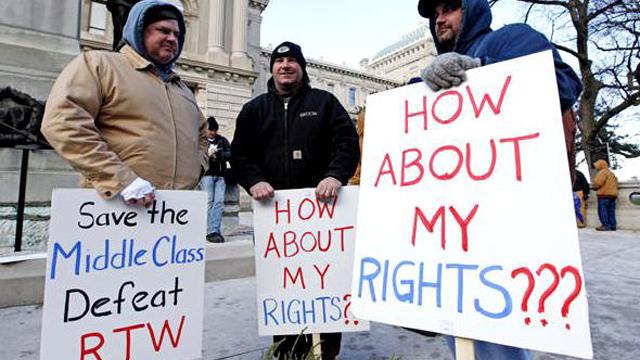
What should one call these Orwellian “right to work” laws? “Right to work for less” is popular. But I like to call things as they are, and these laws do nothing but give people the right to rip-off unions. Or, if you want to be more charitable, the right to free-ride on union dollars.
Virtually every thing you read about RTW laws – even in the progressive media – gets it wrong. CNN's description is typical – the network says that RTW laws allow workers to “opt out of union membership and dues.” This is completely false.
No worker in the United States can be required to join a union, nor can a worker be coerced into joining a union. That's totally illegal.
No worker in the United States can be required to pay union dues. It's against the law.
When a majority of workers in a “bargaining unit” – a hospital or a warehouse or whatever – jump through the required hoops to organize, often braving threats and harassment by management, their union must represent all workers in the unit equally, regardless of whether or not they choose to join the union.
This, again, is the law – they can't negotiate wages or benefits or anything else for their members alone. Workers who choose not to join the union get the same deal as those who do.
It costs the union money to represent their workers. They pay for lawyers and negotiators bear a variety of expenses. And a union contract can require all workers in the unit to pay for their fair share of the direct cost of their representation. (I would be thrilled if some media outlet could get this right someday – it's not that complicated.) This is in a contract freely entered into by management and workers.
Unless, of course, you live in a Right-To-Rip-Off-Unions state. In those states, people who claim to be small-government conservatives and cherish private contracts use the power of big government to deny workers the freedom of contract by prohibiting contracts with fair share provisions.
Now is the difference between “union dues” and the fair share of the cost of representation a semantic one? No, it is not. A fair share costs less than union dues (it cannot be higher by law), and it can't be used for things like donating to political campaigns. This is a key point, as one of the union-busters' go-to lies is that unions force workers to contribute indirectly to politicians or political activities of which they disapprove.
This plays out very simply: it allows workers who choose not to join the union to take advantage of the union's representation without chipping in to cover the costs. And that effectively defunds the union.
That hurts workers everywhere, whether they work in an organized shop or not. Here are the consequences, according to research from the Economic Policy Institute:
• RTW has no significant impact on attracting employers to a state. Surveys show RTW as a minor or non-existent factor for employers when they’re considering locations.
• RTW doesn’t boost economic growth. There’s no relationship between RTW laws and a state’s unemployment rate, per capita income, or job growth.
• RTW lowers wages. Both union and nonunion workers earn an average of $1,500 less per year in RTW states.
• By lowering compensation, they have the indirect effect of undermining consumer spending, which threatens economic growth. For every $1 million in wage cuts to workers, $850,000 less is spent in the economy, which translates into a loss of six jobs.
• RTW threatens employment benefits. Workers—both union and nonunion—are less likely to have either health insurance or pensions through their jobs in RTW states.
3 WAYS TO SHOW YOUR SUPPORT
- Log in to post comments











